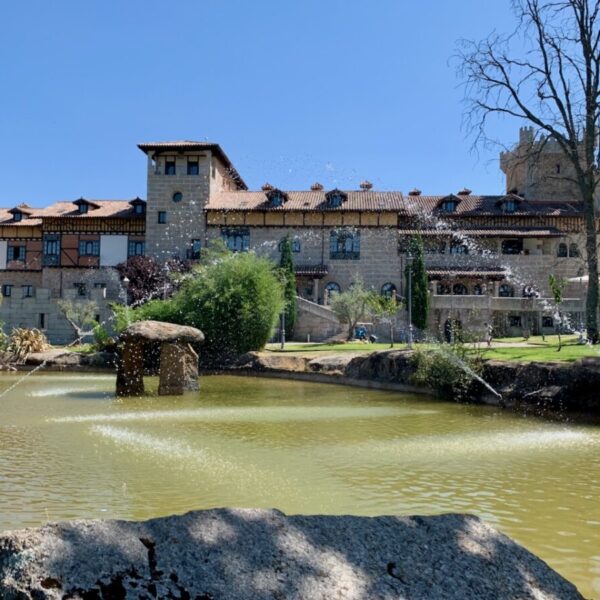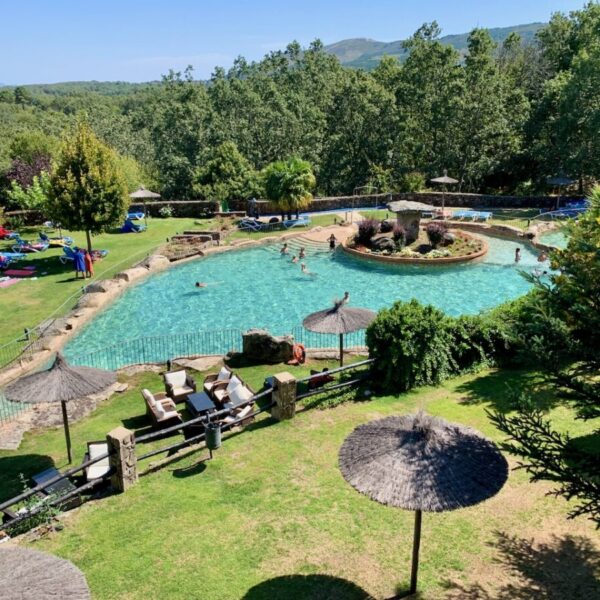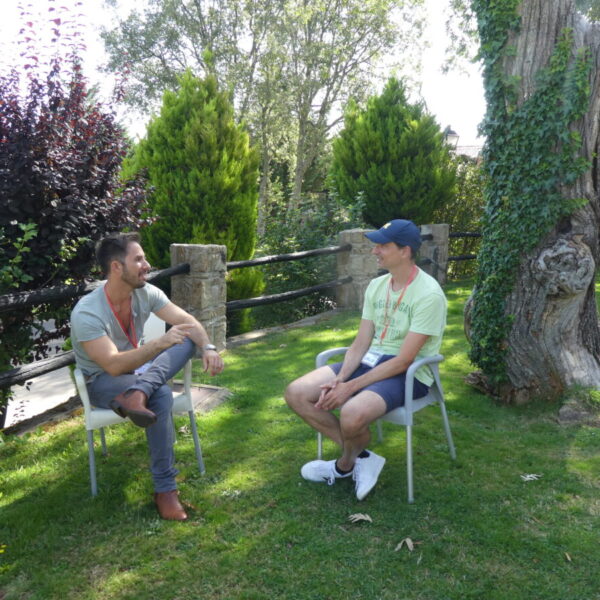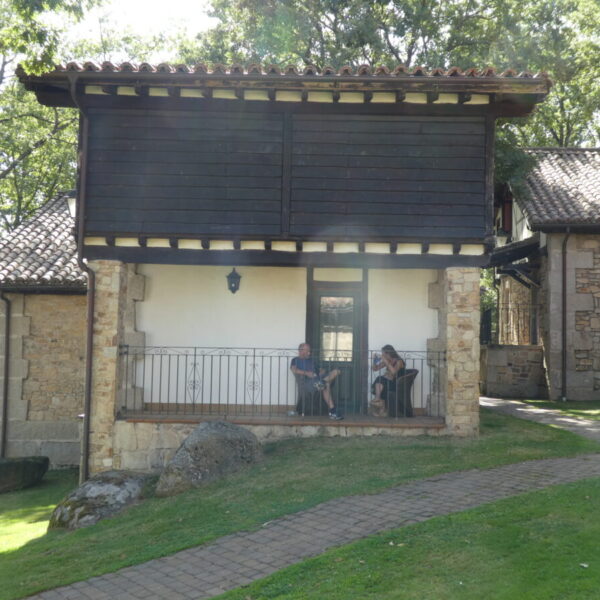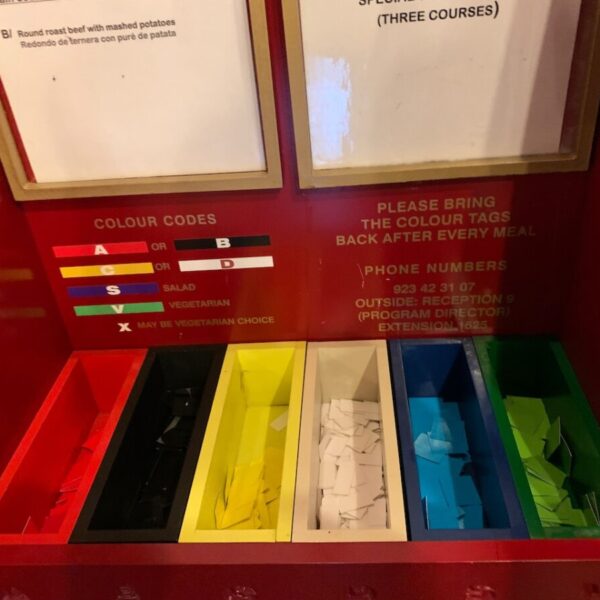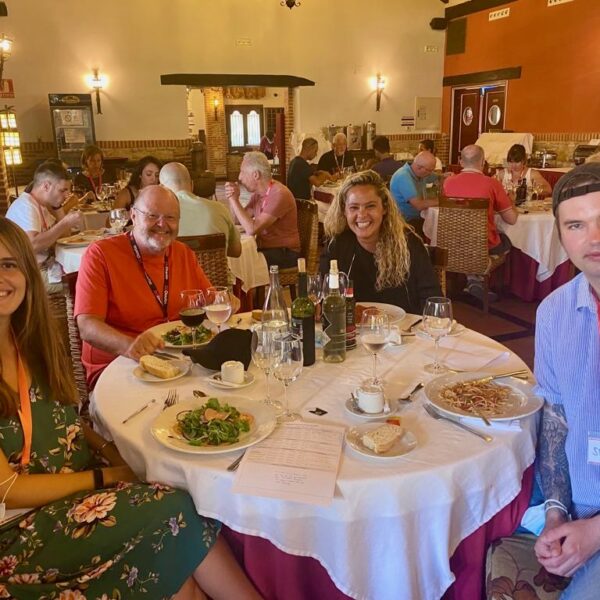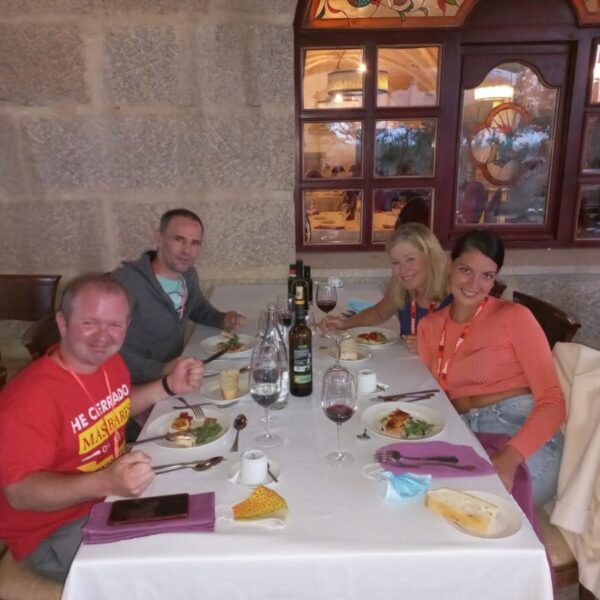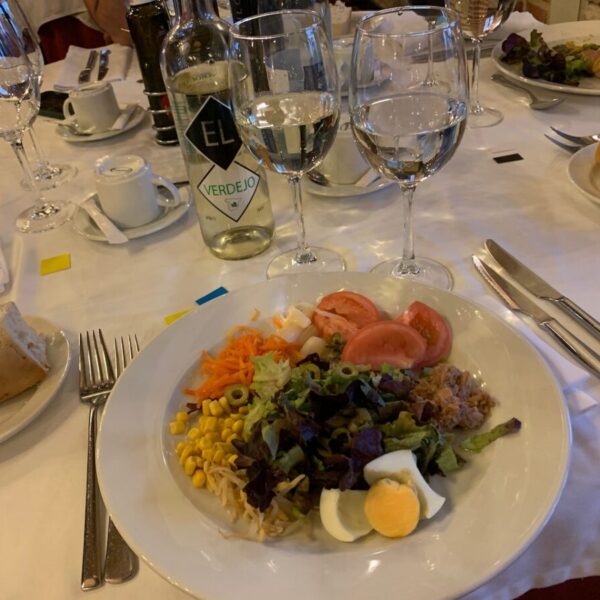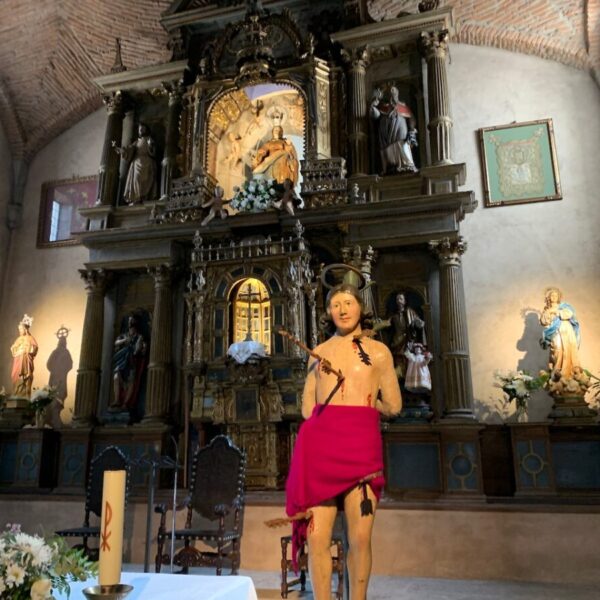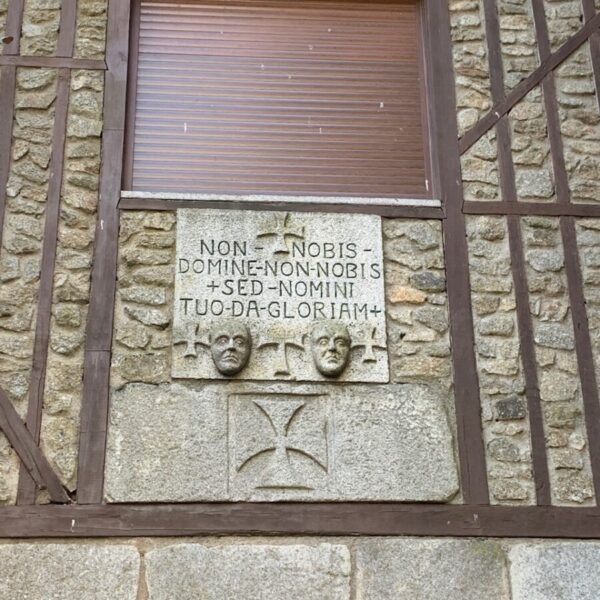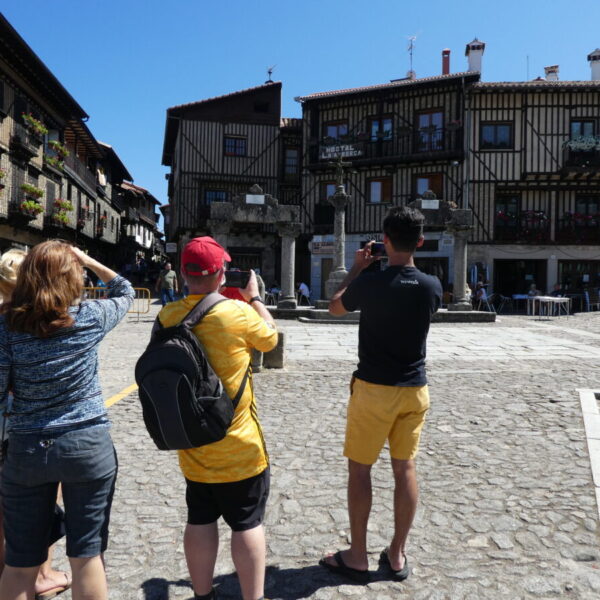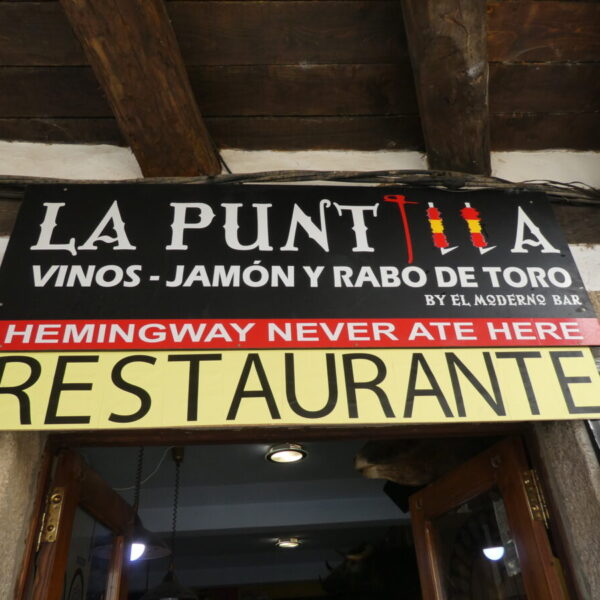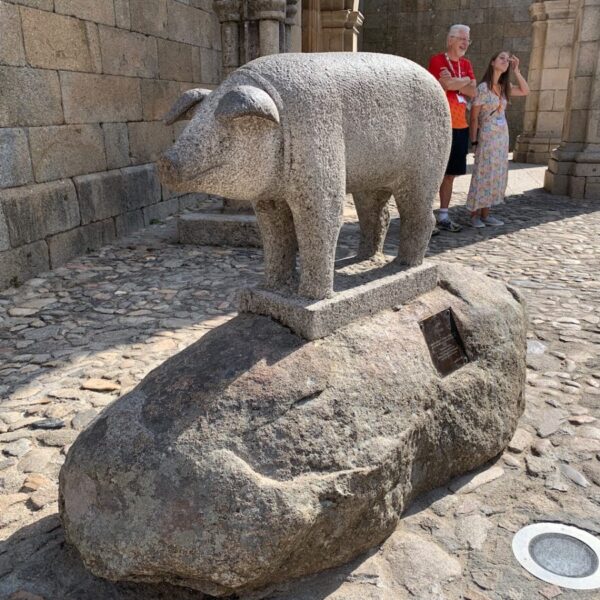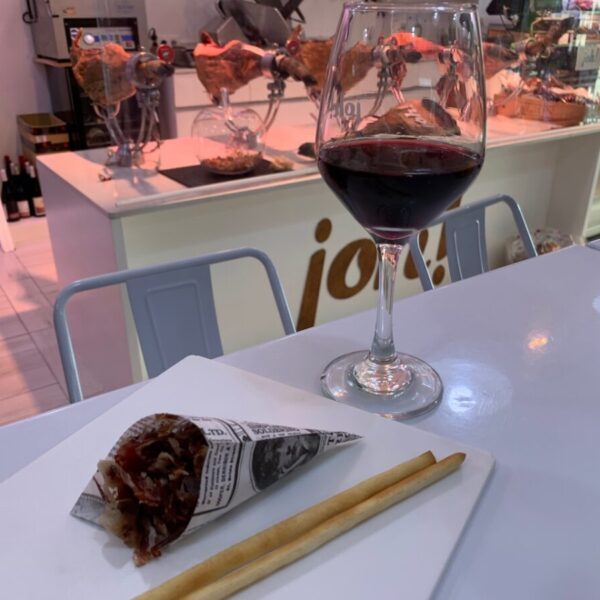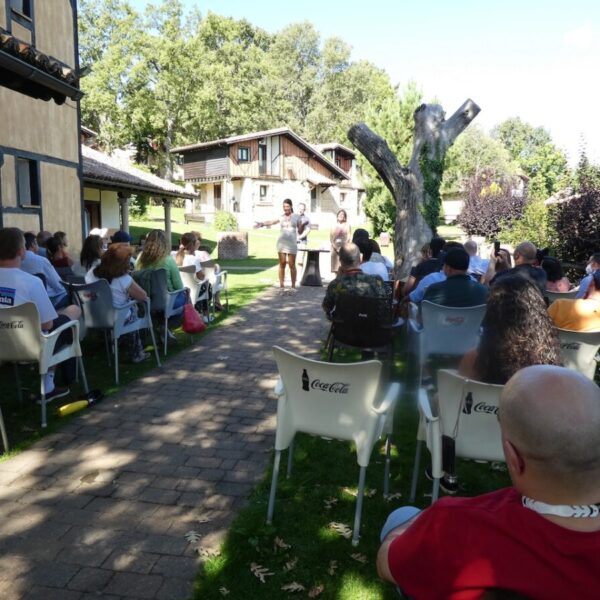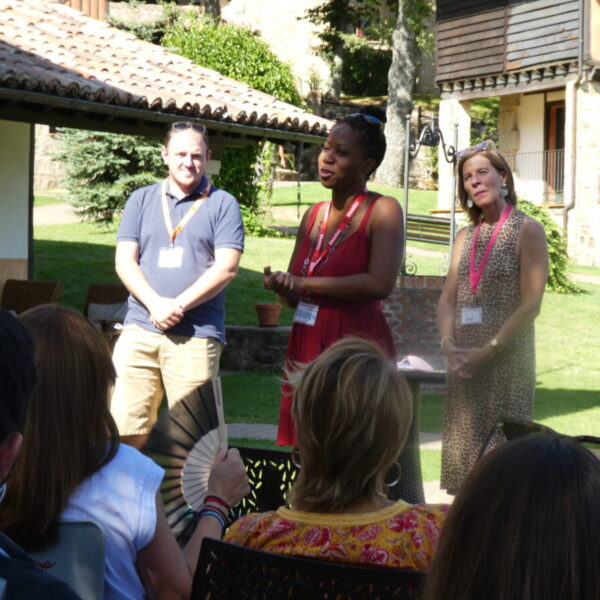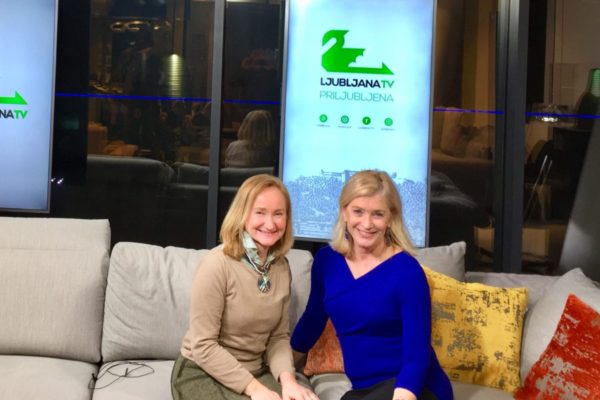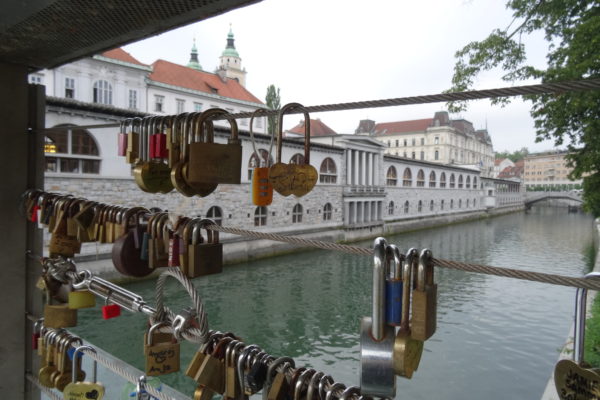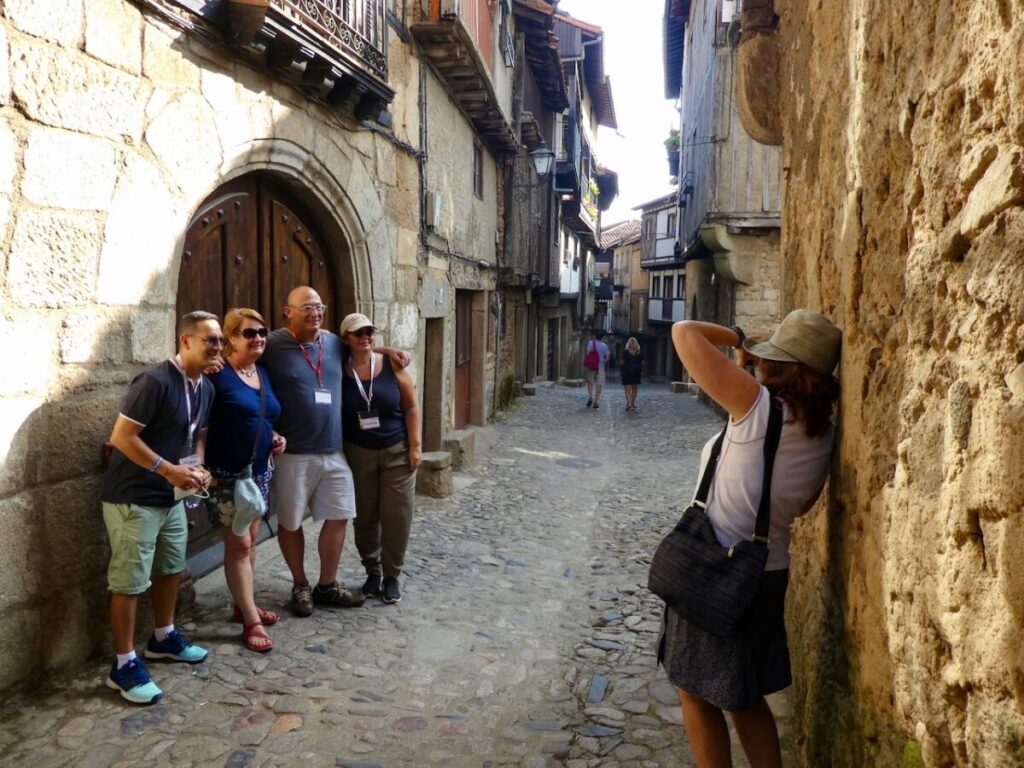

It sounded too good to be true: a free, one-week, all-inclusive stay at a charming resort in Spain for native English speakers. Indeed, there was a catch to this volunteer vacation at Pueblo Inglés.
I was volunteering to talk for more than 100 hours with a group of total strangers — who ended up becoming my friends.
This post explains how to sign up for the Pueblo Inglés program and what to expect. And why this ‘free vacation’ could turn out to be a valuable life experience. But first, here’s a video of the magical week I spent at La Alberca in Spain:
Signing up as a Volunteer for Pueblo Inglés
I first learned about the program from a Facebook group for expats in Slovenia. I found more information on the website for Diverbo, the Madrid-based company that runs the program. After reading up on the different programs and schedules, it only took a few minutes to fill out the Pueblo Ingles application form with my details and a few paragraphs about my background, experience, and motivation for applying. Among other things, I was asked to make a first and second choice for a location in Spain or Germany and program dates.
To submit the application, I was asked to create an account in their “Volunteer Zone.” Only a few weeks later I was invited to a late August program in La Alberca, an historic town in the province of Salamanca and the region of Castile and Leon. I confirmed my availability and got started on travel reservations. Volunteer coordinators helped make sure I would arrive and leave Madrid on the correct dates.
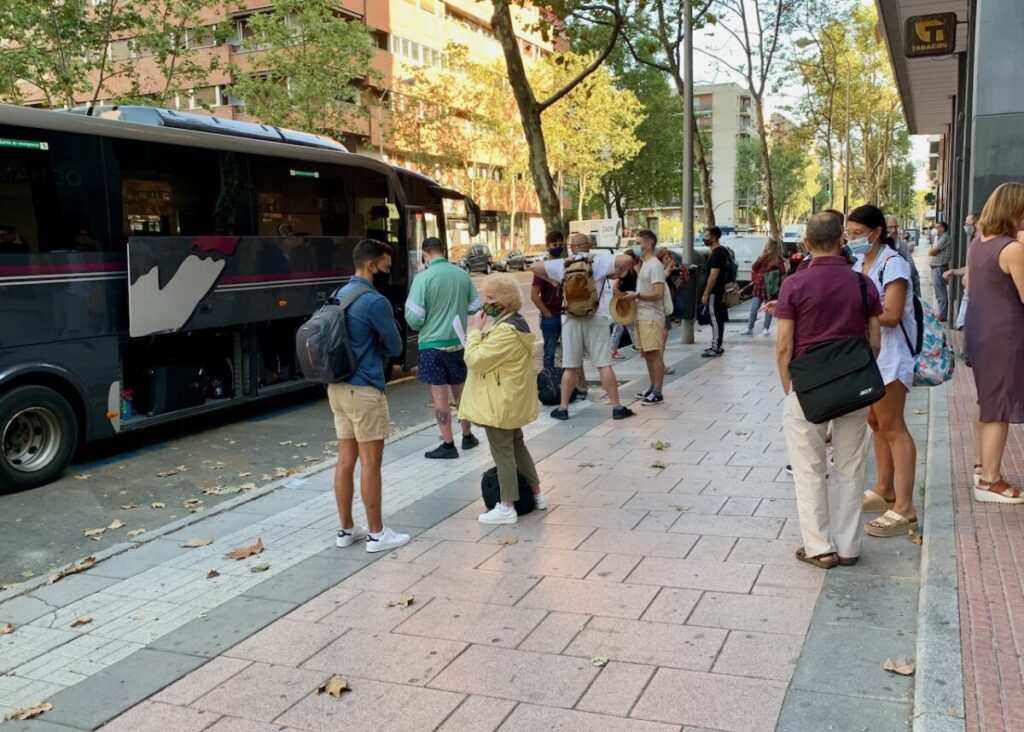
Native English and Spanish speakers arrive at the meeting point in Madrid for a week of total immersion in the English language at Pueblo Inglés. The ‘English only’ rule began on the four-hour bus ride.
Madrid: the Starting Point of Pueblo Inglés
The cost of traveling to Madrid to join the program is NOT covered by Diverbo. But it seemed like a worthwhile use of my frequent flyer miles. Volunteers are also responsible to pay for their hotel in Madrid. The arrival time of my flight from the USA meant that I would have to get there one day early.
I found the mid-priced NYX Madrid Hotel only a few blocks from the meeting point for the bus to Pueblo Inglés. I was content to enjoy the hotel’s rooftop pool and find a neighborhood restaurant for dinner. Other participants have combined their volunteering experience with a longer stay in Madrid or a trip around Spain before or after the program at their own expense.
At 9:15 on a Friday morning, we all got our first look at the people who would be our companions for the coming week. It was also the first encounter with the program leaders, Sam from Wales and Amelia from New Zealand. To ensure that the cross-cultural conversation began on the bus, everyone was asked to sit next to a native of the opposite language. This was the start of the “English only” rule that would last almost the entire week.
Halfway through the four-hour bus ride, there was a snack stop with a scenic view of the walled medieval town of Avila — and a chance to change seat partners. After that, the landscape of golden, rolling hills reminded me of the rural areas in Northern California.
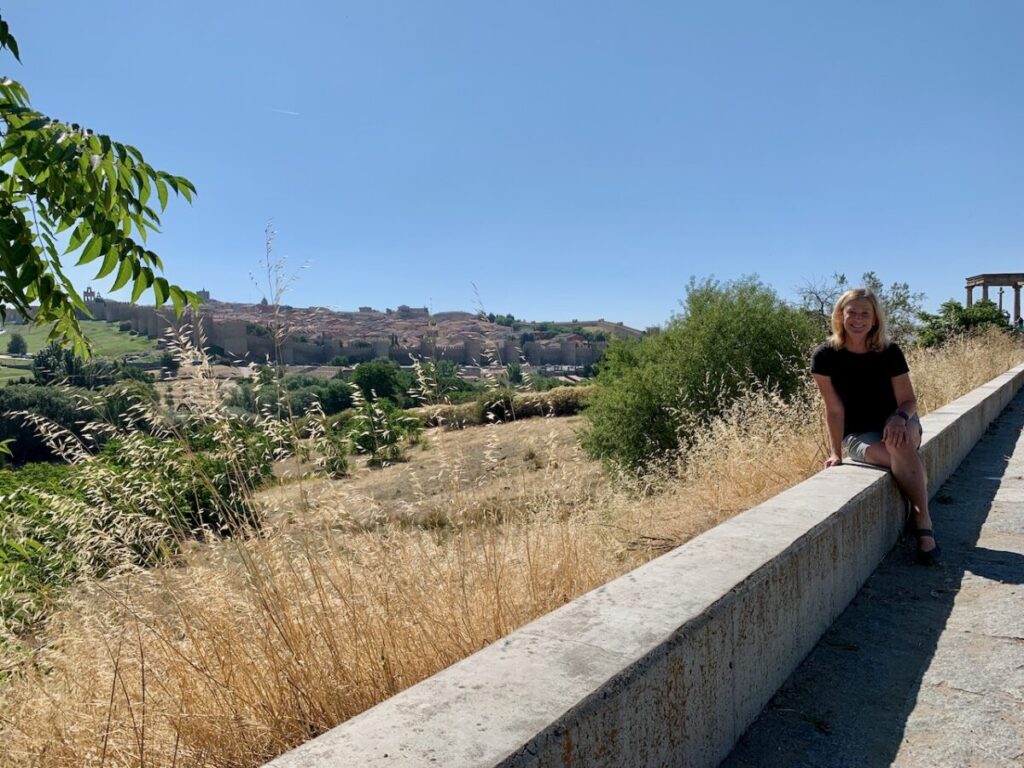
A scenic view of the walled town of Avila, before the bus continued on through golden hills that reminded me of California.
“Don’t get your hopes up,” my first seat-mate warned me. “We’re going to the middle of nowhere.” We shared a laugh and, to paraphrase Humphrey Bogart’s closing line from the film Casablanca, this looked like the beginning of a beautiful friendship.
There were 46 more people for me to meet, a total of 24 Spaniards and 24 Anglos from throughout the English-speaking world. They ranged in age from 23 to the mid-80s.
La Alberca: Abadia de los Templarios Resort
Diverbo has set up its “English Village” on the grounds of a sprawling resort, Abadia de Los Templarios. Students and volunteers are assigned to share two-story villas. The English-learning student is the top floor. Volunteers had private ensuite rooms on the ground floor, along with a living area and kitchenette to share. The kitchens had refrigerators but were not fully equipped, as all of our meals were served in the nearby dining hall that was the hub for the week’s activities.
To avoid breaking the English-only rule, we were cautioned to avoid the main hotel, a modern-day interpretation of a castle that was filled with vacationers — speaking Spanish. But we were able to use the pool, spa or gym in our free time.
The Daily Routine at Pueblo Inglés
One-on-one conversation: After lunch and a group exercise to break the ice, we wasted no time in pairing up for our first one-on-one conversation assignments. It quickly became clear that this English immersion experience was anything but a holiday for our new Spanish friends.
As working professionals in an increasingly global economy, most felt under pressure to increase their job security by improving their English. Some were attending Pueblo Inglés as part of a four-month masters program in English, paid for by their employer.
I met CEOs, CFOs, IT company experts, business consultants, accountants, pharmaceutical company executives, human resources managers, engineers, real estate entrepreneurs, a doctor, an architect, a teacher and more in up to five one-on-one sessions per day as the week progressed. All of them were eager to move beyond the ‘where are you from?’ level of small talk to improve their fluency in the real-life situations they might be facing at work.
Each day began with a buffet breakfast at 9 am. At 10, the leaders would post the pairings for the three morning one-to-one sessions, each lasting for 50 minutes. Once paired up, we were free to walk around the property, sit by the pool or just relax on the shady porches of the villas — as we talked, and talked and talked.
A few of the sessions were required to be “telephone meetings” via mobile or over the hotel phone extensions in the villas. Conference calls were organized as Google meetups around possible business scenarios, such as the launch of a new product or corporate response to customer complaints.
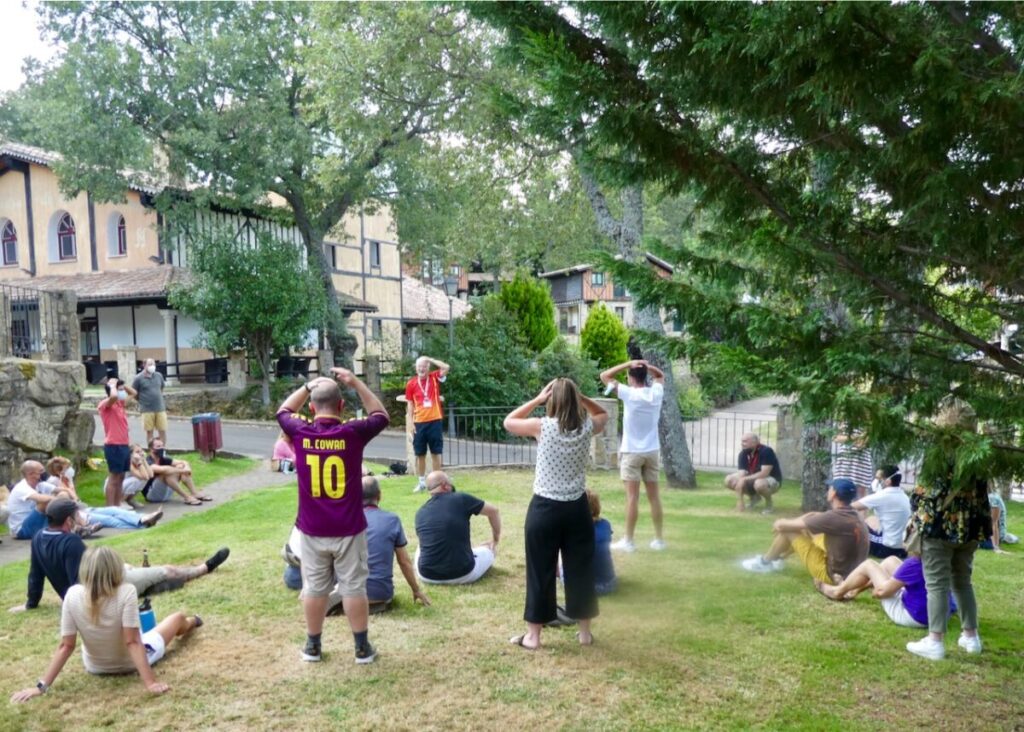
Group activities tested discussion and listening skills, like this rapid-fire game of Simon Says.
Group Discussion: At 1pm, we divided into groups of four for 50 minutes of discussion on a wide range of topics. We were free to choose from a list of questions. Everything, including politics, religion and sex was on the table (if everyone was OK with it).
It was exciting to hear the progress being made by the students; by the end of the week, I could often sit back and listen to them correcting each other! Some of the volunteers were professional English teachers or repeat participants in the program and I truly admired their discussion-leading skills.
Activities and Entertainment: After lunch from 2 to 3 pm, we had free time until 5 pm. This was a chance for a much-needed siesta. But some of us chose to skip the mid-day nap to walk into the town of La Alberca or enjoy the hotel’s facilities.
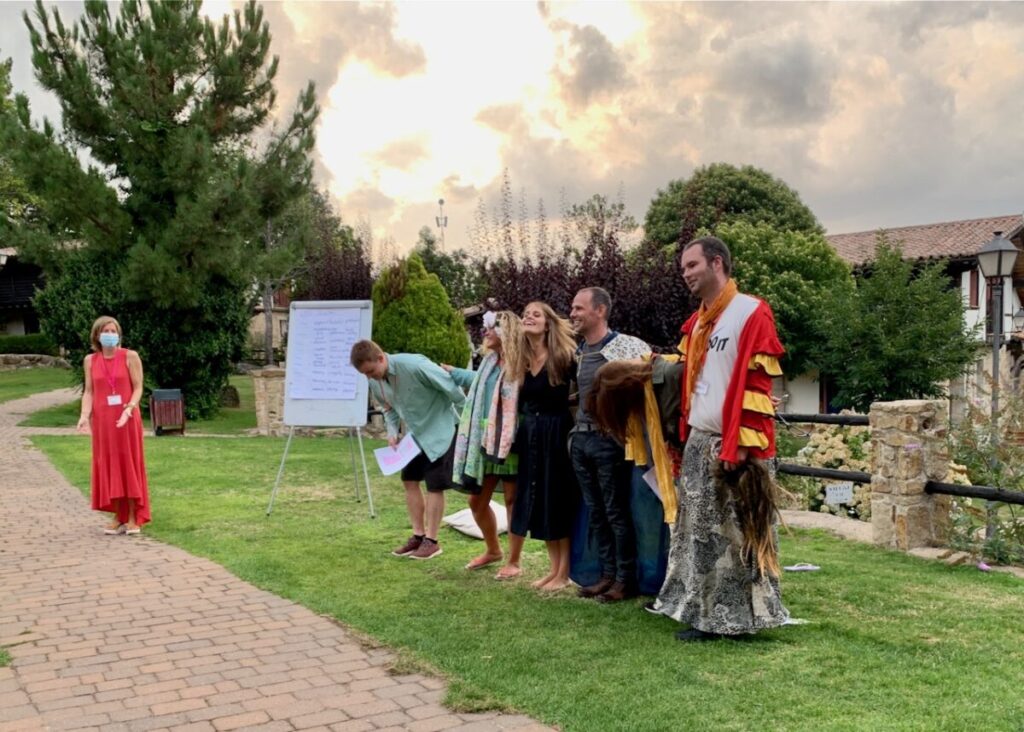
Evening theater performances are entertaining and allow Spanish speakers to gain confidence in English.
Evenings brought another group activity, more one-on-one conversations, and the evening “entertainment.” While Sam attended to the details of the schedule and hotel arrangements, Amelia served as the mistress of ceremonies, selecting various participants to play roles in each evening’s theater performance. This challenged the English-learners to venture out of their comfort zones — and also gave a few volunteers a “free time” break from the one-on-ones when the actors needed to rehearse.
Some volunteers — including me — made presentations to share their various skills. A professional drummer had us all tapping out complicated rhythms. Yoga, line dancing and salsa gave us a chance to get up and move, before sitting down to dinner at the very Spanish hour of 9 pm.
Meals at Pueblo Inglés: One of our most important tasks was to chose our first and second courses for lunch and dinner, using a system of colored chips. This enabled the waiters to get the right dish to the right person. As a vegetarian, I appreciated the effort to offer something for everyone. If none of the fish or meat entrees looked appealing, we could always ask for a healthy salad made with fresh, local ingredients.
Most people took it easy on the red and white wine on the table at meal times to conserve energy for the never-ending talkathon. Others took advantage of the opportunity to buy beer and cocktails in the adjoining bar, which stayed open during optional after-dinner activities until midnight.
Due to pandemic restrictions at the time of our program, everyone was required to be fully vaccinated or recovered and immune to Covid 19. We were assigned to sit in “bubbles” with the same four people at each table for the entire program. This, along with the evening’s entertainment, made it feel like we were on a cruise ship. After a few days, my table felt like I was sitting down to a family dinner.
Presentations: As the week progressed, each English learner was required to give a presentation with a small group of volunteers serving as observers. They were given some instructions on the structure of the presentation, but each was free to choose the topic. Some were business-related, such as the impact of technology and Big Data on personal privacy, but others chose their personal hobbies and interests.
To keep the focus on language, Power Point and other assistive technology was not allowed. This was a high-pressure situation for most of the students, but they all came through with flying colors and were more than ready to relax and celebrate when they were done.
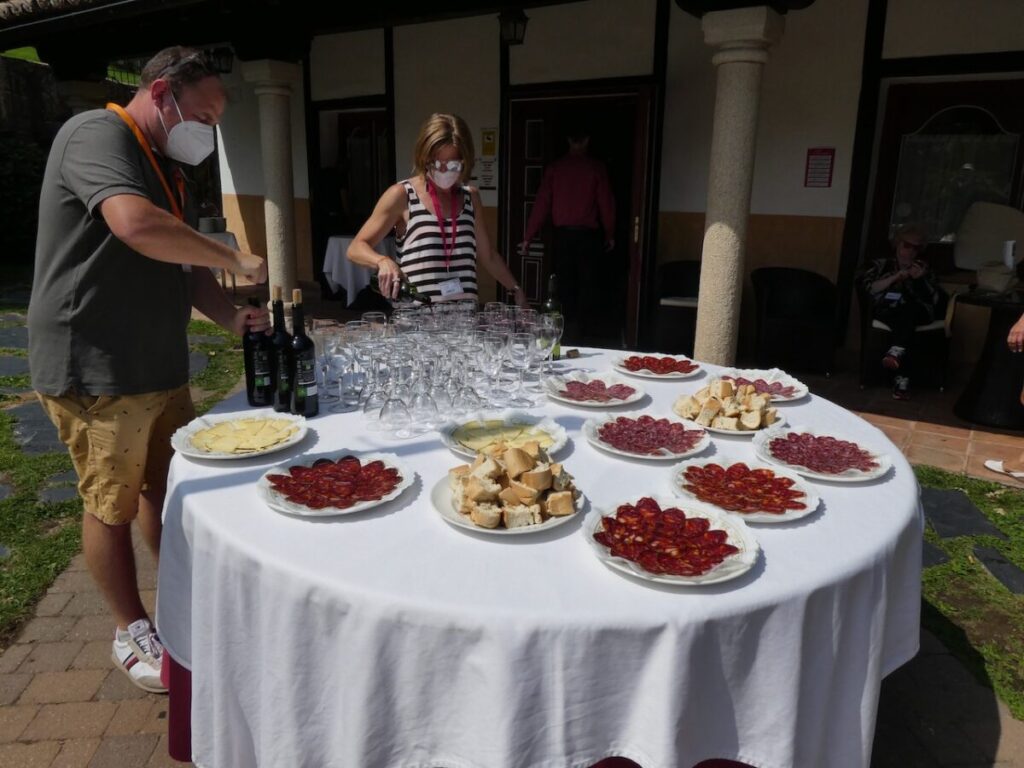
A buffet of local ham cheese and red wine celebrated the local culture of La Alberca Spain — and gave everyone much needed break from the stressful presentations.
Taking a Break to Enjoy La Alberca and Spanish Culture
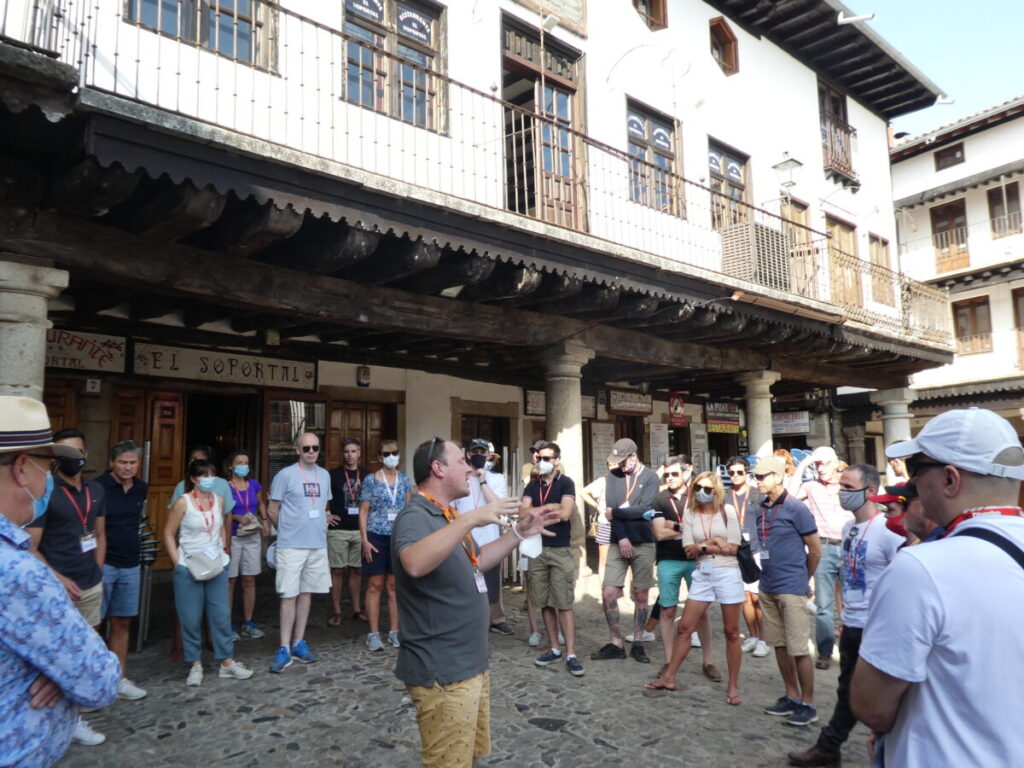
A tour of the UNESCO world heritage town of La Alberca gave us a welcome break from the nonstop talk sessions in English with our new Spanish friends at Pueblo Ingles.
Tour of a Medieval Town: By midweek, we all needed to blow off some steam. The exhausted volunteers knew that our Spanish friends were even more tired and stressed from nonstop talking in their second, third or even fourth language. Sam led the entire group on a walking history tour of La Alberca, a charming medieval town.
We learned that La Alberca had been a banking center for the Knights Templar during the Crusades, and that religious conflict between Christians and Muslims affected much of its history. The surrounding countryside is part of a UNESCO biosphere reserve.
The town’s church was rather plain on the outside, but filled with ornate altars. A local tradition designated one woman and her descendants to walk through the town each night, ringing a bell to round up lost souls. Legend has it that a ghost did the job when one of the daughters didn’t want to go out on a stormy night.
But it’s really all about the ham. There’s a statue of a pig, symbolizing the animal that is allowed to wander the streets of La Alberca each year until being raffled off and slaughtered. Countless pigs have given their lives to become the gourmet ham for sale in many of the storefronts. And it pairs especially well with the local red wine and friends. After a bit of free time, we headed back to Pueblo Inglés for a pica pica — another tasting of local ham, cheese and wine before lunch.
Queimada ceremony: The tradition of flaming booze may have started with early Celtic settlers on the Iberian peninsula, but our decidedly local version involved an alcoholic home brew made by one of our waiters. Three program participants dressed up as witches and recited incantations in English and Spanish before the fiery liquor was declared to be “ready” for us to dip our fingers in and drink. Watch the video to see part of the ceremony and please, while you’re there, subscribe to my YouTube channel for more fun travel videos like this.
Song Contest: Participants split into groups according to the country they represented and chose a song to perform. Although the Canadians, British, Welsh and Americans tried their best, the Spanish had the most enthusiasm, as you’ll see at the end of the video. A few brave souls from Colombia and Chile sang as individuals. And a solitary woman from Scotland brought down the house with her solo performance of the Irish classic, “Danny Boy.”
Saying Goodbye: The final night of the program brought everyone together for one last dinner in the hotel’s outdoor dining area. Due to pandemic restrictions, our group had to skip the official dance party. After the graduation ceremony on the final day, the English-only rule was ended and the tables were turned as I struggled to communicate in my bad California “Spanglish.”
As participants got in their cars or boarded the bus to leave, most were too tired to say much of anything in any language. It was hard to say goodbye, especially to the special people from my “bubble”, with whom I had shared 22 meals. The What’s App group that was formed to share information during the program offered us a way to keep in touch.
Top Takeaways from Volunteering at Pueblo Inglés
Don’t stress if you’re not an expert in English grammar and don’t speak much Spanish. You are coming to Pueblo Inglés to help people learn what’s not in the textbooks: how native English speakers really talk in various accents around the world.
The volunteers’ main job is to ask and answer questions, then listen and let the students talk. Some want corrections more than others. The leaders told us to let students struggle for the words in English and not serve as a human dictionary.
I appreciated spending a week in a beautiful place with beautiful people. I had no decisions to make except what to have for dinner and whether to take a siesta, exercise, or hike into town. It was nice to be away from computer screens for a while; checking social media and email was permitted only during free time except in emergencies.
I went into the week feeling beaten down by the pandemic and life in general. I came away exhausted but energized, knowing I had made a small difference in the lives of some remarkable people that I otherwise would never have met.
Here’s looking at you, kids. We’ll always have Pueblo Inglés.
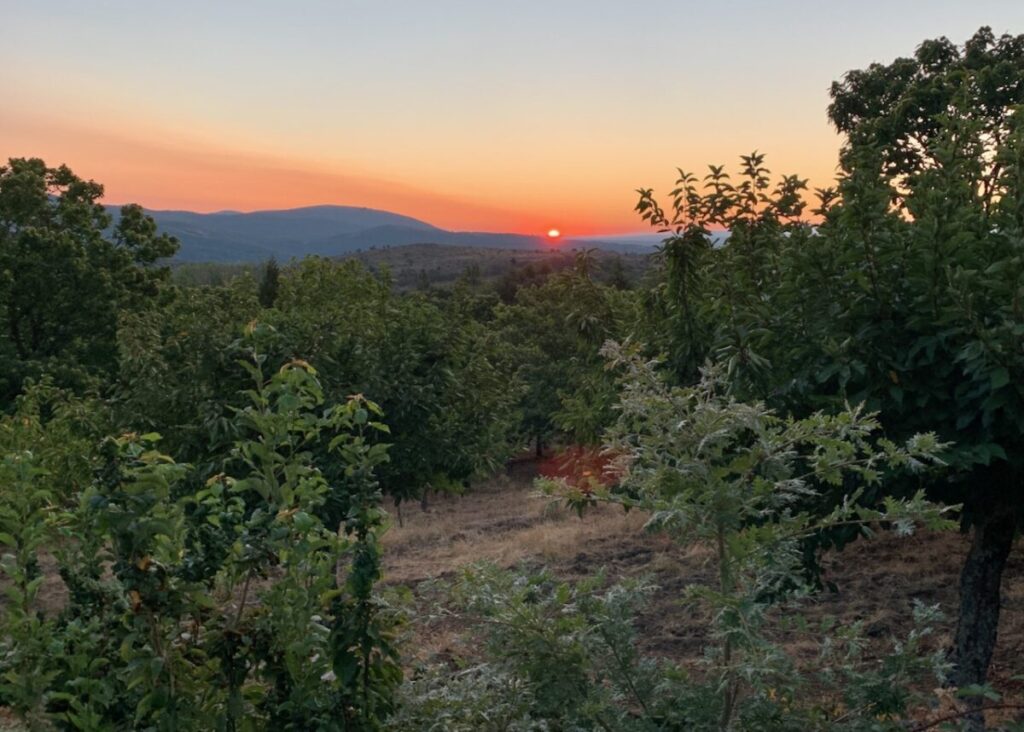
Sunrise in the “middle of nowhere” near La Alberca, which actually is a UNESCO biosphere reserve in Spain.
Terry’s Travel Tips
Staying in Madrid: As mentioned above, I stayed at the NYX Hotel Madrid before the program. After returning to Madrid, I stayed at the Hilton Madrid Airport, which provided a free shuttle bus to catch my plane home the next day. Here are a few more hotel suggestions from Trip Advisor. One of the volunteers, who lives in Spain, recommended the Residencia Universitaria Claudio Coello, a college student dorm in Madrid that books tourists during the summer for a bargain price. Thanks for clicking on the links in this post to browse the reviews on Trip Advisor and book your hotel; it supports this blog at no additional cost to you.
Staying in La Alberca: Even if you’re not on the program, Abadia Los Templarios welcomes vacationers and the Dona Teresa is an alternative for those who’d like to stay in the medieval town.
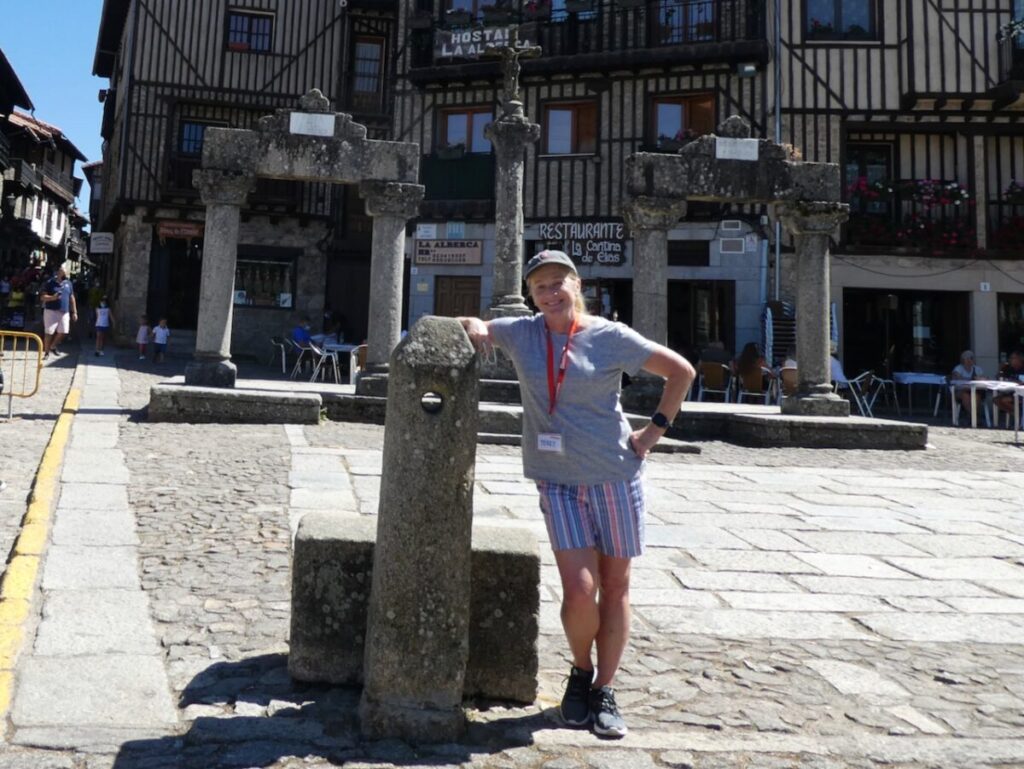
Visiting the town of La Alberca in my free time meant giving up a siesta.
I was grateful to have my own room in a Pueblo Ingles villa as a respite from the 14-hour days of nonstop talking. However, the single rooms were somewhat of a precaution against the spread of Covid and on future trips it’s not guaranteed. If you volunteer with a companion you can request to room together. There was one married Spanish couple in our group. Kids are not allowed. There’s a separate English-learning program for teens.
What to Bring: The Pueblo Inglés dress code is very casual; shorts, jeans, t-shirts and light dresses or skirts were fine during the day. Temperatures got chilly at night, so bring a sweater or sweatshirt. Bring a swimsuit for the pool. You’ll also want some euros for pocket money in case you decide to buy drinks in the bar or souvenirs in the town. Use of the hotel spa in your free time is an additional cost. Everything else — room and meals — is covered for native English-speaking volunteers.
Want more insider tips on European life and travel? Like @strangersinthelivingroom on Facebook, and sign up for the occasional email when there is a new post here on the blog. You can follow Terry Anzur on Instagram, Twitter and Pinterest. More travel-planning tips on Trip Advisor @strangersblog.

